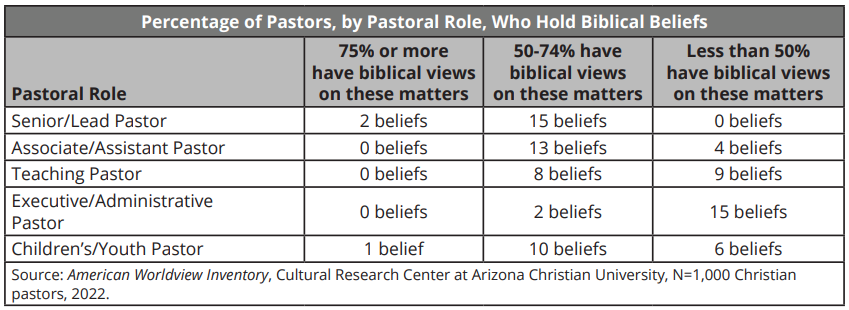How ‘Progressive’ Christians Misuse the Bible
It is one thing to reject the authority of the Bible entirely, claiming that it is not the inspired Word of God. It is another thing to appeal to the authority of Scripture while at the same time claiming that the biblical writers didn’t understand certain aspects of human nature or spiritual truth. That makes no sense at all, yet it is a common practice of “progressive” Christians. (For my use of the term “progressive,” see here.)
Why even cite the Bible, as if it carried some kind of divine authority, while making yourself the arbiter of ultimate truth? Why quote Scripture if it can be trumped by the latest theories of psychology or sociology?
It is common to hear “progressive” Christians say things like, “Well, the biblical writers were inspired, but they didn’t know what we know today.” Or, “That teaching simply reflects the culture the ancient authors lived in.”
But what, then, do they mean by “inspiration”? And in what sense is the Bible the Word of God?
It is true that biblical writers used observational language, speaking of things like the rising and setting of the sun. (Most vividly, see Psalm 19:4-6; Ecclesiastes 1:5.) And it is certainly likely that the biblical writers believed that the sun went around the earth.
But this has nothing to do with how we are to conduct our lives or what the Lord requires of us or who He is in His very essence and nature.
It’s another thing entirely when we claim that the biblical writers called us to live a certain way in order to please God, but then argue that this was based on their limited cultural understanding.
In other words, we know better than they did.
Someone might protest, “Then why don’t the women in your church wear head coverings, as Paul mandated in 1 Corinthians 11? You’re guilty of the very thing of which you accuse us!”
That’s a fair question, but it is also a question that is easily answered.
In Paul’s day, it was customary for married women to cover their heads in public, whereas girls and unmarried women would not need to follow that practice. But what about a gathering of Christians in a home? In that setting, which was private in one sense but public in another sense, what would be appropriate? Should the married women cover their heads?
Paul said that they should cover their heads and that this would be a sign of their submission to their husbands. He also indicated that maintaining gender roles was important.
In our day, the customs have changed, so head coverings are not the issue. But the principles remain the same: gender distinctions are important and there are established authority structures in the home and in the church.
And note that Paul did not say, “Women who do not cover their heads will be excluded from the kingdom of God.” Not at all.
But he did say that people who practice adultery or drunkenness or homosexuality will be excluded (1 Corinthians 6:9-10). There is clearly no comparison between not wearing head coverings and indulging in the sins of the flesh.
When it comes to homosexual practice, progressive Christians argue that the biblical authors were not familiar with loving, same-sex relationships, otherwise they would have blessed them. Instead, it is claimed, they were familiar with abusive same-sex relationships, such as pederasty or prostitution or promiscuity.
But this argument breaks down on numerous levels:
First, are these progressive Christians claiming that loving, committed same-sex relationships did not exist throughout history? If so, what does that say about the fleshly and sinful nature of same-sex relationships? Was there no true, gay love in the ancient world? Is it only a recent phenomenon? That alone would be a bizarre and self-defeating argument.
Second, there is plenty of evidence that at least some of the biblical authors would have been familiar with committed gay couples. Some scholars have even argued that the situations Paul dealt with in Corinth would be very similar to the situations we deal with today.
Third, Paul taught that homosexual practice was fundamentally wrong, a violation of nature (meaning, the way that God created men and women). This was a matter of natural law, of biology, of divinely intended function, not a matter of societal practices or preferences.
Fourth, Jesus certainly understood human nature, and He only reinforced biblical teaching about sexuality and marriage. Or are you telling me that He was unable to gaze into the hearts of LGBTQ people and see their struggles? (A professing gay Christian once used that very argument: Jesus really didn’t know what was in people’s hearts. So, this “gay Christian” chose to downgrade who Jesus was rather than recognize the error of his ways.) Since Scripture tells us plainly that Jesus did, in fact, know what was in every human heart (see John 2:24-25), we must accept His judgment on the matter. God established marriage as the union of one man and one woman for life (see Matthew 19:4-6), and all sexual acts committed outside of that union are sinful and defiling (see Matthew 15:19-20).
Fifth, the idea that the biblical authors simply didn’t understand same-sex attractions is to say that they were not inspired by God and that they did not have divine insight into human nature and the nature of sin. Again, this is a completely self-defeating argument, since, if you can succeed in proving that the biblical authors didn’t get these things right, then you have just undercut the authority of the Scriptures.
It is one thing, then, for a skeptic to say, “Who cares about what Paul had to say? He was obviously homophobic. The same goes for Moses and Jesus.” At least that would be consistent.
It is another thing to say, “Yes, Moses, Jesus, and Paul didn’t have full understanding of human sexuality, especially when it comes to same-sex attractions. We’re more enlightened today. But we still respect the Bible and believe it is God’s inspired Word.” Hardly!
Instead, in the words of Augustine, “If you believe what you like in the Gospel, and reject what you don’t like, it is not the Gospel you believe, but yourself.”
This article was originally published at AskDrBrown.org.

